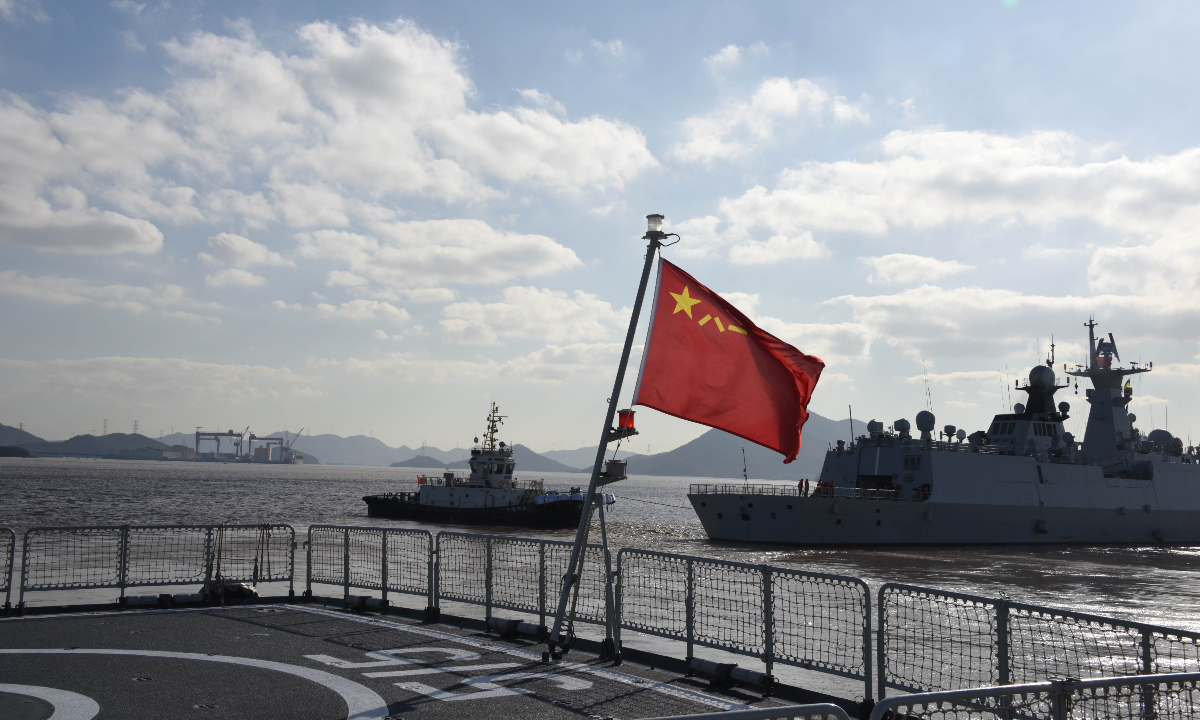
A Chinese naval fleet taking part in the China-Russia Joint Sea 2022 military exercise weighs anchor from a military port in Zhoushan, East China's Zhejiang Province on December 20, 2022.
From December 21 to 27, the Chinese and Russian navies will hold the Joint Sea-2022 military exercise in waters east of the sea area from Zhoushan to Taizhou, East China's Zhejiang Province. This is a normal arrangement based on the annual military cooperation plan between the Chinese and Russian militaries. However, due to the background of the Russia-Ukraine conflict and the fact that the military exercise area is the closest to Taiwan in the past 10 years, the misunderstandings and misinterpretations arising from this joint military exercise are more than in previous years. US and Western public opinion is watching the military cooperation between China and Russia with vigilance. US Ambassador to NATO Julianne Smith even said that China and Russia are increasingly sharing a toolkit of strategies to undermine NATO. Their tone is as if China and Russia are doing something wrong.
Since 2012, the China-Russia joint sea military exercise has been held for 10 consecutive years and has become a normalized cooperation mechanism. First of all, this is the legitimate right of China and Russia, and there is no need to report to anyone; second, the strengthening of strategic cooperation between China and Russia, including in the military field, is beneficial to both sides. This time, China and Russia are sending the active main battleships and related equipment of the Chinese and Russian navies. Some subjects of the exercise, such as anti-submarine and air defense, involve relatively sensitive data, reflecting the high strategic mutual trust and transparency between China and Russia, which will be further deepened and enhanced along with the exercise.
As China and Russia are two adjacent permanent members of the United Nations Security Council, the constructive military interaction between the two countries is of positive significance to maintaining regional peace and stability. This has not changed because of the outbreak of the Russia-Ukraine conflict. China's clear position will not change because of the military interaction. In today's world dominated by the US, China and Russia are strategic balancing forces. The strengthening of strategic coordination between the two countries will help maintain a fair and just international order, and counter hegemonism, unilateralism and power politics.
The fact that China and Russia are partners and non-aligned is different in nature from military and political blocs like NATO and the US security alliances with the UK and Australia. The China-Russia joint military exercise is on the premise of increasing security and mutual trust between the two sides, and does not target any third party. China and Russia maintain an open, transparent and stable bilateral relationship, which is by no means a threat to the region. China-Russia friendship is an important part of world peace and development. From China-Russia cooperation, what the US and the West read should not be "threats," but the proper way to get along, that is, how to build a new type of major-power relationship based on equality and mutual respect.
Of course, any military exercise must have a certain deterrent effect. We have seen that there are only a few who are really worried or even afraid of the joint military exercise, and it's basically out of a guilty conscience. This exercise is indeed not far from Taiwan, and includes the subject of joint blockade. "Taiwan independence" secessionist forces see themselves as the target. Let it be. But in the final analysis, the root cause of their anxiety is their "Taiwan independence" secessionist tendency. If they didn't engage in "Taiwan independence" secessionist moves, they wouldn't have felt overwhelmed by the mainland's joint military exercises.
The restlessness of some people in the US and the West also reflects their lack of confidence. There is no doubt that the China-Russia joint military exercise will naturally improve the two countries' capabilities in maritime combat and joint operations. And it is normal that this will have a deterrent effect on US' simultaneous suppression of China and Russia, and Japan's cooperation in the containment. This shows that our power is strong enough to make those forces that intend to be against us feel uncomfortable or tense. This is a good thing, and to a certain extent it can deter them from making rash attempts. At the regional level, the China-Russia joint military exercise aims to enhance the stability of the Asia-Pacific region and prevent countries outside the region from making trouble and sowing discord in East Asia.
As for the joint military exercises, in the past two years, the US and its allies have not only conducted more and more frequent military exercises in the Asia-Pacific region, but also described each military exercise with the most eye-catching adjectives to show off their "deterrence capabilities." The targets of those military exercises are very obvious, and "deterring China" is almost the unified tone of the US public opinion. Following this logic, do we have to question each other equally every time?
All in all, China and Russia have the right to hold joint military exercises, so they should do so aboveboard with confidence. The normal and legitimate military cooperation between China and Russia will not be bound by the fact that some people may be unhappy or dissatisfied. In fact, for these people, no matter what China does, they can always pick the bone out of the egg.




